“There was always some new kind of fun …”
 July 5th, 2022 by jules
July 5th, 2022 by jules
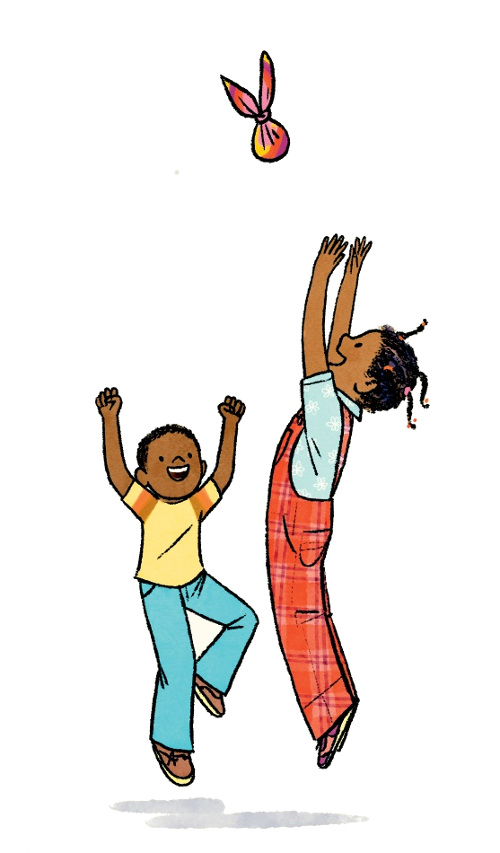
If you haven’t seen Jacqueline Woodson’s newest picture book, be sure to find a copy of The World Belonged to Us (Nancy Paulsen Books, May 2022), illustrated by Leo Espinosa. It’s a story that captures childhood summer play on the streets of Brooklyn during the time Woodson herself was a child. It’s in past tense, as if Woodson herself is looking back. And it is a shot of joy.
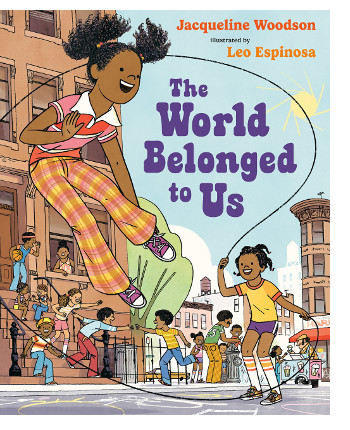 This is about school’s-finally-out, sun’s-shining, time-to-be-free play. (The illustrator dedicates this to his childhood friends with a: “Tag, you’re all it!” It occurs to me that’s a fitting summary for this book as a whole.) Woodson opens the book with: “In Brooklyn in the summer not so long ago ….” It is, based on the clothing, maybe the late 1960s or early ’70s. Grown-ups are off working and school has just ended: “us kids were free as air. Free as sun. Free as summer.” These neighborhood children gather outside, kids who speak Spanish, Polish, Chinese, English, German.
This is about school’s-finally-out, sun’s-shining, time-to-be-free play. (The illustrator dedicates this to his childhood friends with a: “Tag, you’re all it!” It occurs to me that’s a fitting summary for this book as a whole.) Woodson opens the book with: “In Brooklyn in the summer not so long ago ….” It is, based on the clothing, maybe the late 1960s or early ’70s. Grown-ups are off working and school has just ended: “us kids were free as air. Free as sun. Free as summer.” These neighborhood children gather outside, kids who speak Spanish, Polish, Chinese, English, German.
It’s hot, so “someone always found a wrench to turn the hydrant on.” This is an example of one of the book’s many delights — its concrete details that ground an otherwise buoyant-in-every-way story. So many of these specificities fill the pages: that “someone else found a soup can to scrape against the curb till the top and bottom were gone and it wasn’t a soup can anymore. It was a super shooter!” Or that they shot bottle caps filled with tar in the streets. Or “flicked their double-dutch ropes into blurs.” Or played steal the bacon and kick the can. Though her mother would straighten her hair for school, the narrator runs into the water blasting from the fire hydrant as her hair “sprung back from straightened curls to natural coils because it was finally summer and hair too has a right to be free.”
There are scraped knees and stories of stitches and broken arms, because joy is often coupled with pain in this life, but it’s only a momentary pause in what is otherwise a story of unfettered exultation. Woodson’s text flows breezily, reading like a free verse poem, and she nails the exhiliration of energetic play, the feeling of independence it brings, and the camaraderie of the children.
I don’t want to be that 50-year-old who waxes grumpily about how children don’t live in a world like this now, but it’s true that summer play for young children is different today — if this book were set in 2022, we’d see more faces in devices. And it’s not like children of the ’60s and ’70s led worry-free lives (hardly), but there’s no denying life can be stressful for children today in ways that present new kinds of grim (and even ways, heaven bless us all, that recycle past grims we hoped we would be beyond in this country in the 21st century). This book isn’t just a lyrical time capsule of joy; it’s a gust of joy children need now. And, sure, it can be appreciated by readers of all ages, but remember its fabulous title. This one is for children — the world belongs to them, after all, and they “ruled the block” (as you’ll see below) — and it’s a book for them to read now and, to quote the final page, “always.”
And Woodson nails the landing. The final pages are exquisite (“our words echoed out over the block like a lullaby we’d always remember”), but I’ll let you read that for yourself when you find a copy of this one.
Oh! And I haven’t even mentioned Espinosa’s technicolor illustrations, filled with movement and graceful lines (I mean, holy wow, just look at that cover!) and captivating perspectives — but here are some spreads so that you can see for yourself.
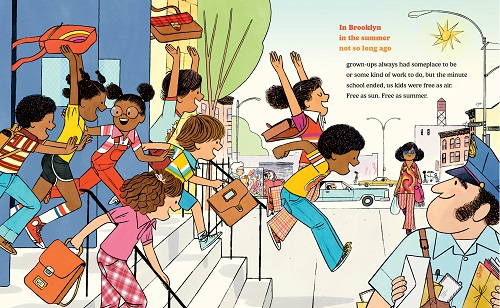
(Click spread to enlarge and read text in its entirety)
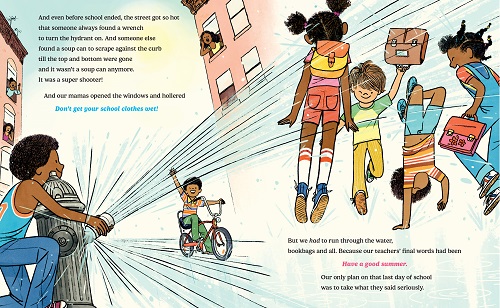
Our only plan on that last day of school was to take what they said seriously.”
(Click spread to enlarge and read text in its entirety)
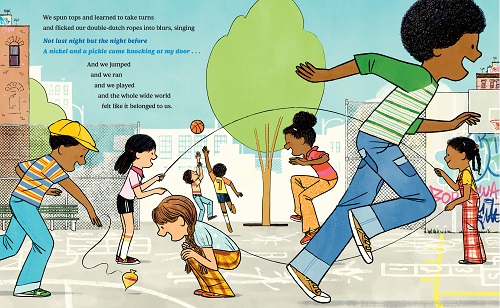
and the whole world belonged to us.”
(Click spread to enlarge and read text in its entirety)
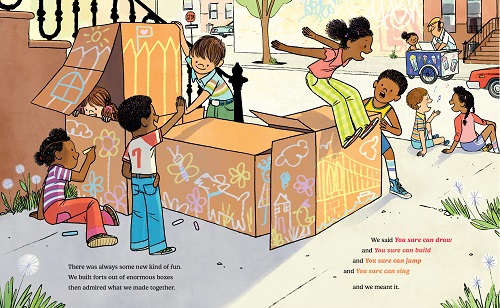
(Click spread to enlarge and read text in its entirety)
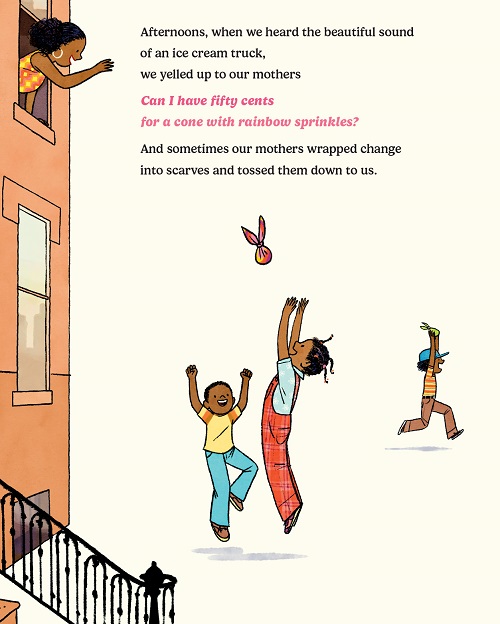
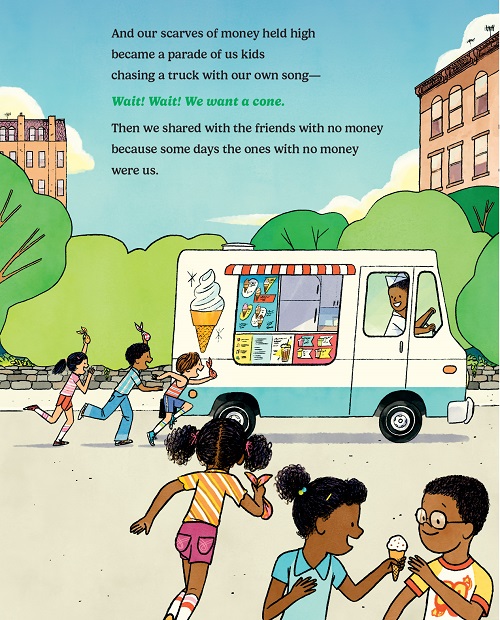
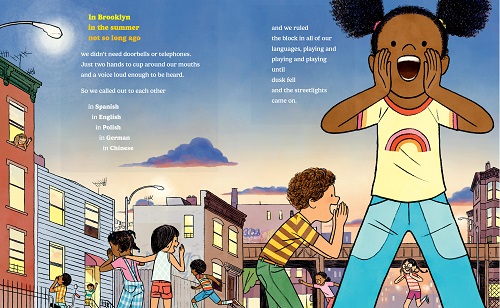
(Click spread to enlarge and read text in its entirety)
THE WORLD BELONGED TO US. Text copyright © 2022 by Jacqueline Woodson. Illustrations copyright © 2022 by Leo Espinosa and reproduced by permission of the publisher, Nancy Paulsen Books, an imprint of Penguin Random House, New York.
